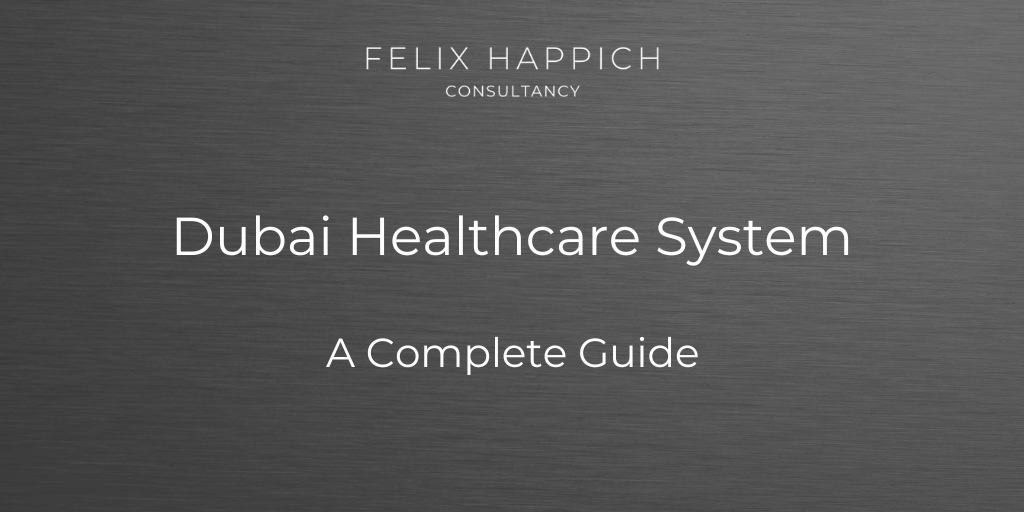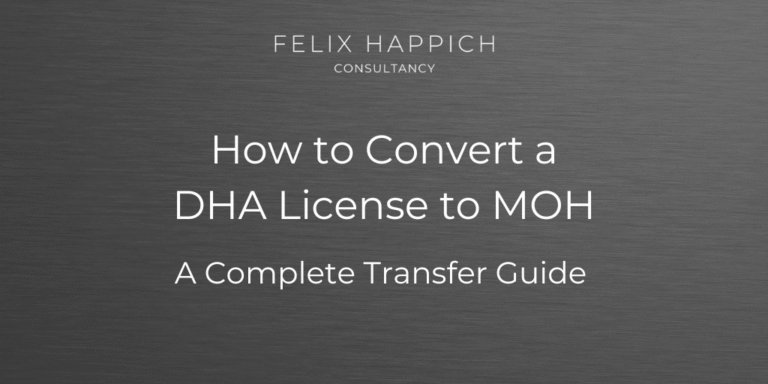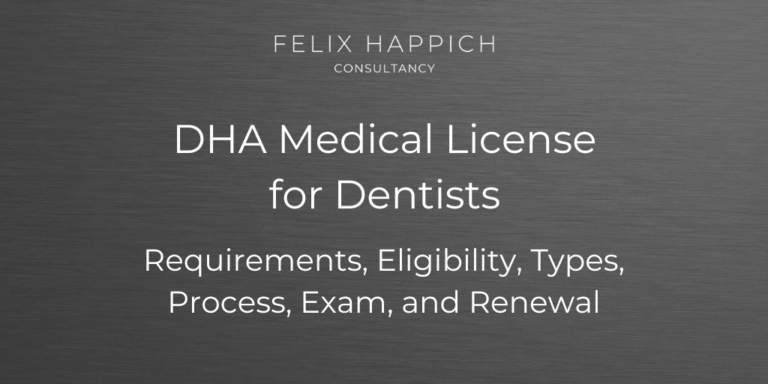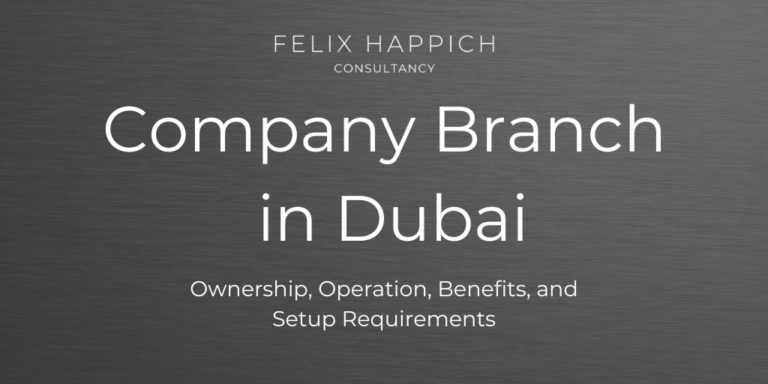Dubai’s healthcare system is considered among the global health leaders. It ranked 5th globally in quality and facility services and 13th for the medical tourism industry, as per the Medical Tourism Index. The emirate ensures easy access for citizens, expatriates, and tourists through a structured public-private partnership. More than 691,000 medical tourists were treated in Dubai, according to the government’s official portal, highlighting the healthcare excellence and international recognition of the Emirate.
The overall healthcare system is regulated by the DHA (Dubai Health Authority). The DHA is responsible for setting up regulations and putting them into effect. It manages all healthcare operations in accordance with government medical laws and MOHAP rules as a central healthcare authority.
The prominent sections it regulates include the licensing framework, medical infrastructure, and services. However, for insurance-related activities, it is supported by the Dubai Health Insurance Corporation (DHIC), which was established under Decree No. 17 of 2018.
The healthcare system in Dubai is divided into two sectors: public and private. Public healthcare in Dubai provides access to services, funded by the DHA. The services offered include emergency response (998), maternity support, women’s health programs, and dental care. Private care is funded privately and operated by independent providers. It offers faster appointments and premium services, including both large and small-scale surgeries.
Dubai’s healthcare system maintains Quality and safety through strict safety protocols. Hospitals such as Rashid Hospital and American Hospital Dubai earned national recognition in 2025 for their advanced medical services. The UAE, including Dubai, ranks 30th globally for care quality. For emergencies, help is provided by calling 998. Additionally, pharmacies remained open24/7.
The healthcare system of the emirate offers high-quality care with several benefits. These include the best hospitals, mandatory health insurance, and enhanced services through e-prescriptions and telemedicine. Additionally, residents have access to modern hospitals with skilled doctors from over 100 countries. This diversity ensures additional care in every field.
Along with this, the medical costs in Dubai are lower than in the US or Europe, with no tax on services. Expatriates benefit from employer-mandated health plans, including outpatient, inpatient, and emergency coverage. The insurance structure also aims to lower the financial risk by reducing the high direct costs.
Overall, Dubai’s healthcare system follows a structured approach focused on both quality and innovation. The 4,922 licensed health facilities and 4.47 million insured residents, according to DHA reports, highlight that service delivery is highly regulated, which is evident in the UAE’s 27th global ranking for healthcare innovation, according to the 2024 World Index of Healthcare Innovation report.
Healthcare Governance and Regulation
Dubai’s healthcare system is regulated by the Dubai Healthcare Authority (DHA), along with inputs from MOHAP as a federal body, and Dubai Health Insurance Corporation for insurance. The details about each one are provided below
Dubai Healthcare Authority (DHA)
DHA maintains public health standards and ensures professional competency by configuring strict rules for licensing and services. Along with this, it also manages digital health records and coordinates emergency systems. Through its systematic approach, DHA builds trust, improves the service quality of the healthcare environment.
Overall, the Dubai Health Authority makes the emirate’s healthcare system align with the WHO’s health system efficiency principles and support the UAE Vision 2031. Dubai’s health model prioritizes long-term sustainability, system integration, and health equity, ensuring its growing population continues to receive safe, affordable, and efficient medical care.
Dubai Health Insurance Corporation
The Dubai Health Insurance Corporation, operating under the Dubai Health Authority, regulates health insurance following the Resolution No. (17) of 2018. It unifies government health plans into the “Enaya Program,” covering Dubai citizens, government employees, and families.
This system, integrating “Saada” and others, ensures wide-scale, high-quality healthcare access through efficient collaboration and oversight, offering beneficiaries direct support from the Dubai Health Authority or HR departments for service and information.
Structure of the Healthcare System
Dubai’s healthcare system runs through two different structures, including the public and private sectors. However, despite the differences, both are regulated by the Dubai Healthcare Authority (DHA). The public sector includes major government hospitals like Rashid Hospital and Latifa Hospital, while the private sector consists of medical facilities that have their own setup.
Dubai’s healthcare system works in three levels: primary, specialist, and emergency care. Most people first visit a local health center for routine needs. These centers, supported by the DHA, help with things like daily check-ups and long-term care. Additionally, doctors refer patients to specialists if they need deeper care, either in a public or private hospital.
At the same time, Emergency services are provided by DHA-operated trauma centers, such as the one at Rashid Hospital, as well as private facilities that meet DHA accreditation standards.
On the other hand, telehealth is now a core part of Dubai’s healthcare delivery. DHA offers 24/7 remote consultations through the program “Doctor for Every Citizen”.
Healthcare Access
Dubai’s healthcare system shows a strong coverage with a highly organized network of public and private hospitals and clinics. Public hospitals in the emirate provide free emergency care and quick access to medication.
On the other hand, private health care gives easy and quick access to premium medical services. The private sector, consisting of hospitals and clinics like Mediclinic and American Hospital Dubai, offers faster access to specialized care.
Overall, access to primary care reaches 90% of Dubai’s population with an initiative named the Basmah initiative. Telehealth is also a growing aspect of healthcare in Dubai. It increased by 60% in 2023 as per the DHA reports. This is part of the government’s efforts to improve healthcare access regardless of the patients’ location.
Healthcare Cost
Dubai ranks 19th globally for international health insurance costs, with an average premium of AED 22,600 per year in 2023, reflecting a 7% year-over-year increase as per the Pacific Prime Report 2023. This increase is the collective effect of several key factors.
The main factors are mandatory health insurance regulations, a high volume of expatriates, and the presence of premium private healthcare facilities. Additionally, Dubai’s healthcare system is further influenced by the presence of international insurers, who shape competitive offerings specifically for globally mobile individuals.
In comparison, the UAE’s average premium for individuals stands at AED 22,570, just AED 30 lower than Dubai. The UAE continues to rank among the top 20 most expensive countries for international health insurance. These figures highlight the importance of securing comprehensive coverage to manage the rising medical costs in Dubai effectively.
Healthcare Benefits
Dubai offers exceptional healthcare through public and private providers. For instance, Rashid Hospital offers subsidized services for Emiratis and affordable care for expats using the DHA health card. On top of that, the health insurance structure covers basic care.
More than 95% of residents are insured, according to the DHA Annual Report 2000. On the other hand, Private hospitals provide faster access and personalized services with advanced facilities. Some of the main benefits are provided below
- High standards, accessible care.
- Subsidized care for nationals.
- Personalized care, shorter wait.
- Mandatory health insurance coverage.
- Specialized services, global reach.
- Preventive care and wellness.
Dubai Healthcare Hospitals and Institutions
Dubai provides a strong healthcare system with leading public and private hospitals. These facilities offer high standards of care, supported by modern technology and qualified professionals, ensuring accessible medical services for all residents and visitors. The healthcare sector grew 9% in early 2024, with over 5,000 licensed facilities and 59,500 healthcare professionals as per the report of WAM, an Emirati news agency.
Advanced electronic medical record (EMR) adoption across 2,089 facilities, though improvements are still needed as per the study “Adoption of Electronic Medical Records in Healthcare Facilities in the Emirate of Dubai”. The Dubai Health Authority also funds ongoing medical research to improve disease treatment and patient care. Some of the main Hospitals in both the public and private sectors are listed below;
Public Hospitals:
- Dubai Hospital
- Rashid Hospital
- Latifa Hospital
- Al Jalila Children’s Specialty Hospital
- Hatta Hospital
Private Hospitals:
- American Hospital Dubai
- Mediclinic City Hospital
- NMC Royal Hospital
- Thumbay Hospital
- Iranian Hospital





